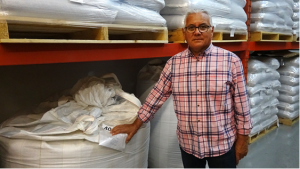News
DTI Collaborates on a ‘Wild’ New Partnership
By Daniel Downs, DTI Program Coordinator
Jan 9, 2023
Posted in: Community Building, DTI

While many of you have seen wild rice being served in some of the fancier farm-to-table, organic, and specialty restaurants in Saskatchewan, very few of you may have realized what it takes to get wild rice from water to plate.
From the harvesting, processing, and distribution of rice, there are as many players involved in the world of wild rice as you would see in a standard farming operation. Most of the work is taken on by a single boat and operator, similar to a traditional combine harvester you see all over on Saskatchewan family farms.
While these family farm combine harvesters are readily available at any Agriculture dealer in Saskatchewan, the harvesting boats used for Wild Rice have been custom-built by the individual Wild Rice harvesters (some as old as the 1970’s) with little change to their general design over the last 40 years.
The harvesting boats you see in Saskatchewan all have certain similarities but are built and customized for the unique conditions of each area. They are generally 12’-18’ feet long and 5’ wide, flat-bottomed aluminum hull boats, with a 10’ collecting tray and an air-cooled 503 Rotax engine attached to an aircraft propeller (think of a Florida Everglades airboat built for slow and steady operation).
With many of the boats designed and built several decades ago, many of the engine parts and engines themselves are no longer available or discontinued. It has only been due to the ingenuity of the wild rice harvesters that the boats have remained in operation for as long as they have without a substantial retrofit or redesign. Again, picture a family farm operating on custom-built machinery from as early as the 1970s with limited access to parts and a harvesting window as short as a long weekend.
This need to retrofit, redesign, and repair existing equipment has been an ongoing reality of NWC Wild Rice Company and the many harvesters whom provide wild rice for processing and retail distribution. Something as small as a half-day missed on the lake because of a mechanical issue can see a substantial drop in the quality and quantity of the harvest.
Knowing this reality all too well, Nap Gardiner, NWC Wild Rice CEO, along with a group of area wild rice harvesters, began working on a solution. The group approached Dumont Technical Institute, Saskatchewan Polytechnic’s Office of Applied Research and Innovation, and Agricultural Equipment Technician programs with the goal of creating a training program that could remedy the issue within the industry. Collaboratively, the group hopes to work with partners to develop a repair and maintenance program for existing and future wild rice harvesting equipment, and to design and fabricate a new boat system that will take into account modern engine technology and environmental factors.
On June 14th and 15th, 2022, representatives from DTI, Saskatchewan Polytechnic, and the provinces north western communities met with NWC Wild Rice Company and the area’s wild rice harvesters in Beauval to put plans in place to support the communities through programming and design initiatives. Over the next couple of years, DTI and Saskatchewan Polytechnic have committed to working with NWC Wild Rice Company and the harvesters on a new boat design, with repair, maintenance, and fabrication programming committed to the north western communities to support wild rice initiatives.
While this programming is still being developed, it is an extremely exciting initiative that will allow the wild rice industry in Saskatchewan to flourish for years to come.
